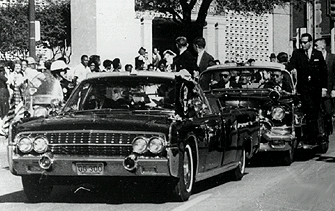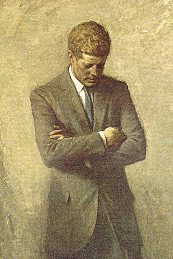He married Jacqueline Bouvier on September
12, 1953. Also in 1953 in the Boston area he advanced to
senate. In 1955 while recovering from a back operation he wrote
"Profiles in Courage" which won him the Pulitzer Prize.
Not long after marriage she had to help him through a serious illness plus
his injured back. After his illness he went toward national and
international issues. In 1956 he almost gained Democratic Vice
President. He helped get a compromise among Northern and Southern
positions on the civil rights bill passed in 1957. Three years later
he was the first ballot nominee for President. One of his
injunctions was at that time was "Ask not what your country can
do for you-- ask what you can do for your country. In 1961 he
was elected the 35th President. After Russians installed missiles in
Cuba, in 1962 he imposed a quarantine on all offensive weapons bound from
Cuba. This meant that U.S. warships would halt and search Russians
ships. He expressed his determination in these words "This
secret, swift and extraordinary build up of communist missiles in an area
well known to have a special and historical relationship to the U.S. and
the nations of Western Hemisphere-- is a deliberately provocative and
unjustified change in the status quo which cannot be accepted by this
country if our courage and our commitments are ever again to be trusted by
either friend or foe." Then on October 28 after an exchange of
notes between Kennedy and Premier Khrushchev, it was announced that the
Soviet Union would withdraw its offensive weapons in Cuba. During
that missile confrontation Kennedy received widespread international
support and later was credited with having achieved a turning point
favorable to the west in the war. In another tension he responded to
the Soviet Union under nuclear tests. He urged them to join the
United States and Britain in an agreement not to conduct tests in the atmosphere.
On August 5, 1963 after negotiations the U.S., Britain, and the Soviet
Union signed a limited nuclear test ban treaty forbidding atmospheric
testing of nuclear weapons. This marked the first limitations of
arms expansion since the cold war began. In Southeast Asia,
the dominant threat of Chinese Communist domination forced the president
to strengthened the defense of that area. Although limited numbers
of the U.S. military advisers had been sent to the South Vietnam for
anti-guerrilla operations since 1954 have increased in numbers under the
Kennedy administration from about 700 to more than 1,5000. On a
global scale, Kennedy established the peace corps, in March 1961 he
authorized through this program headed by his brother-in-law, Sergeant
Shriver, Many Americans were encouraged to value their skills to
"sharing in the great common task of bringing to man that descent way
of life which is the foundation of freedom and a condition of
peace". In anticipation of the growth of the European common
market, he obtained from congress the Trade Expansion Act of 1962, which
granted him authority to bargain by offering drastic tariff
reductions. "Acting our own, by ourselves we cannot establish
justice throughout the world", he asserted on July 4, 1962.
"But joined with other free nations, we can...assist the developing
nations to throw off the yoke of poverty." In November 22 1963,
he was on a speechmaking in Dallas they were riding and cheering enthusiastically
as their open car passed.
|
 |
Then at 12:30 an assassin fired several
shots, striking Kennedy twice in the base of the head and neck and
seriously wounding John Connelly, governor of Texas, who was riding with
Kennedy. Kennedy was rushed to Parkland Memorial Hospital.
About a half hour later the president was announced dead. That day
the police arrested Lee Harvey Oswald for the murder of Kennedy.
Oswald had lived for a while in the Soviet Union. He killed Dallas
policeman J.D. Tippet while resisting arrest. Two days later in the
basement of the Dallas police station, Oswald was shot and killed by Jack
Ruby a night club member. In 1979 the house
assassinations committee after two years of investigation said that Lee
Harvey Oswald probably was part of a conspiracy that also may have
included members of a organized crime. After the death of Kennedy
and Oswald 18 material witnesses died.
6 by gun fire
|
![]()

